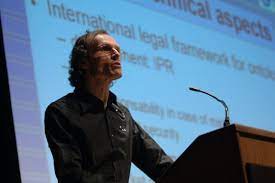Basic Formal Ontology Summit Meeting: Difference between revisions
No edit summary |
No edit summary |
||
| Line 30: | Line 30: | ||
[[File:Download.jpeg|none|100px|frame| | [[File:Download.jpeg|none|100px|frame| | ||
[https://www.researchgate.net/profile/Alan-Ruttenberg Alan Ruttenberg] | [https://www.researchgate.net/profile/Alan-Ruttenberg Alan Ruttenberg]<br />Director of Clinical and Translational Data Exchange<br />University at Buffalo, School of Dental Medicine]] | ||
Director of Clinical and Translational Data Exchange | |||
University at Buffalo, School of Dental Medicine]] | |||
| Line 41: | Line 37: | ||
[[File:JannaHastings_OntologyPrecisionHealthWorkshop.png|none|100px|frame| | [[File:JannaHastings_OntologyPrecisionHealthWorkshop.png|none|100px|frame| | ||
[https://jannahastings.github.io/cv/ Janna Hastings] | [https://jannahastings.github.io/cv/ Janna Hastings] <br />Assistant Professor of Medical Knowledge and Decision Support, Institute for Implementation Science in Health Care, Faculty of Medicine, University of Zurich <br />Vice-Director, School of Medicine, University of St. Gallen]] | ||
Assistant Professor of Medical Knowledge and Decision Support, Institute for Implementation Science in Health Care, Faculty of Medicine, University of Zurich | |||
Vice-Director, School of Medicine, University of St. Gallen]] | |||
| Line 52: | Line 44: | ||
[[File:Riccucci.jpeg|none|100px|frame| | [[File:Riccucci.jpeg|none|100px|frame| | ||
[https://www.researchgate.net/profile/Ryan-Riccucci-2 Ryan Riccucci] | [https://www.researchgate.net/profile/Ryan-Riccucci-2 Ryan Riccucci]<br />Division Chief, US Border Patrol]] | ||
Division Chief, US Border Patrol]] | |||
Revision as of 04:01, 29 November 2022
Announcement
The 2023 Basic Formal Ontology Summit Meeting will be held May 23rd-25th, 2023. The aims of the meeting are:
- to bring together researchers who have played an important role in the development and application of BFO, to highlight the practical impact and value of using BFO as a top-level architecture,
- to identify and work through outstanding issues experienced by users of BFO,
- to begin the creation of a set of BFO-conformant ontologies in the domain of government policy and data
Subsidiary goals are:
- to showcase real-world examples of incorporation of BFO in development pipelines and their practical impacts
- to promote collaboration across different groups of BFO users
- to share case studies illustrating challenges arising in BFO use, evaluation, interpretation, and revision
- to reveal differences in interpretation of BFO terms and relations, and of associated strategies for using BFO
- to share strategies of evaluation of BFO from different user bases
- to identify and disseminate strategies for improving the quality of BFO-based ontologies
Keynote Speakers
We are happy to announce four keynote speakers (information updated as it becomes available):

Division Chief, Biomedical Ontology
Department of Biomedical Informatics
University at Buffalo, Jacobs School of Medicine & Biomedical Sciences
Title: BFO 2020’s Axiomatization: The Good, The Bad, and The Ugly
Abstract: The Basic Formal Ontology (BFO) is undoubtedly the most frequently cited upper ontology in the biomedical literature. It is also claimed to be used as the foundation for many biomedical application ontologies. However, a closer look at these ontologies makes it clear that many of them deviate considerably from even the most basic principles upon which the BFO is built. Reasons can be derived from published papers that describe these ontologies. One reason is the popularity of OWL and tools such as Protégé of which the limits are poorly understood. A second one is the loss of semantics that arises from representing the BFO exclusively by means of binary relations, thus ignoring certain principles underlying the BFO, notably the requirement for temporal indexing in relations involving continuants. Although the importance of these and other principles has been stressed in many papers and presentations by BFO authors, education therein seems to be lacking or is at least inadequate. The recent axiomatization of the BFO in First Order Logic (FOL) might offer an opportunity to remediate the situation. Soon after its public availability in September 2021, I started to use the BFO’s CLIF files in my ontology and referent tracking courses to explain BFO’s foundational principles. For some assignments, students were expected to write axioms for terms and relations they intended to include in the ontologies they were developing as part of their MSc or PhD thesis. I also embarked on a still ongoing project to develop a set of tools to make axiom-based ontology design easier for students lacking a solid background in formal logic and/or computer science. It is therefore encouraging to see that others are following similar paths and, for example, have shown that automatic reasoning with FOL annotations can be used to detect previously unnoticed errors in simple OWL-based classifications. In this talk, I will focus on some of my and my students’ experiences with the use and development of a parser/generator for BFO2020-style CLIF axioms, and a reasoner for satisfiability testing of both axiomatized ontologies and instance data expressed in their terms. I will discuss how these experiences – good ones (yeah, temporal reasoning becomes possible!), bad ones (is there a bug in the reasoner or are temporal regions not what I thought them to be?), and ugly ones (is the resulting model one that we intended?) – might be used to improve the documentation of the BFO, to make axioms more actionable and informative while still logically equivalent and to provide a smoother path to axiomatization of related ontologies such as the Ontology of General Medical Science, the Information Artifact Ontology and the Ontology of Biomedical Investigations.

Director of Clinical and Translational Data Exchange
University at Buffalo, School of Dental Medicine
Title: TBD

Assistant Professor of Medical Knowledge and Decision Support, Institute for Implementation Science in Health Care, Faculty of Medicine, University of Zurich
Vice-Director, School of Medicine, University of St. Gallen
Title: TBD

Division Chief, US Border Patrol
Title: TBD
Date
May 23 (Tuesday) - 25 (Thursday), 2017
Venue
University at Buffalo, Buffalo, NY, 14260
Organizers
John Beverley (University of Buffalo, Buffalo, NY), [1]
Barry Smith (University at Buffalo, Buffalo, NY), [2]